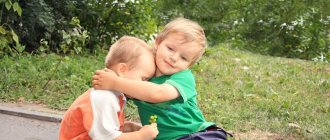Directions of moral development of a younger preschooler
In early preschool age, the development of the body’s mental processes occurs. The child’s capabilities expand: he can independently perform various household operations and master self-service skills. In addition, his social contacts are expanding: the child enters a preschool educational institution, where he interacts with new adults, as well as a group of peers. This requires focusing on developing the foundations of social interaction and establishing positive contacts.
Are you an expert in this subject area? We invite you to become the author of the Directory Working Conditions
The moral development of a younger preschooler is implemented in the following areas:
- Formation of elementary moral ideas. They affect the basics of behavior, its norms, ideas about good and evil, good and bad, right and wrong. The teacher introduces children to different situations and the behavior of their participants, analyzing their moral meaning and significance.
- Formation of the foundations of a culture of behavior. It requires mastering the rules of etiquette, showing politeness and tolerance towards other people. Here, the basics of cultural behavior in everyday life, in play and other activities of the child are mastered.
- Development of the basics of independent activity. They are necessary for the formation of one’s own views and beliefs, and the development of a worldview. Independence develops in everything: from self-service to the performance of various educational and work tasks.
- Formation of moral interaction with adults. Children are taught to respect their elders, listen to them, follow their instructions, and be polite. It is explained to children that an adult requires the child to do something for his own good, and not because he is an authority and does not take into account the child’s opinion.
- Active development of the sensual side of the personality. Children are taught to show their feelings and express them adequately. Emerging feelings and emotions must be manifested in real action. Otherwise, their development is pointless.
- Giving a humanistic orientation to the behavior of a preschooler. There is learning to establish positive social contacts, the formation of the habit of performing actions according to moral principles, the skills of moral interaction with the outside world and their predominance in any area of activity are developed.
Finished works on a similar topic
Course work Moral education of children of primary preschool age 400 ₽ Abstract Moral education of children of primary preschool age 280 ₽ Test work Moral education of children of primary preschool age 230 ₽
Receive completed work or specialist advice on your educational project Find out the cost
Features of moral development of young children
At an early age, children begin the process of moral personal development, which
- cognitive (information) aspect – knowledge and ideas about moral concepts, standards, norms, rules, personal moral qualities;
- emotional and motivational aspect - moral feelings, social and moral emotions, moral motives and preferences, moral assessment and self-esteem;
- behavioral aspect - moral actions and deeds, moral habits, i.e. implementation of moral norms and requirements.
The interrelation of cognitive, affective and behavioral components in the personal sphere determines the unity of moral consciousness and behavior . These components only begin to form at an early age. This is facilitated by children’s desire to collaborate with adults and their high imitation.
In early childhood, the child begins to understand certain moral rules of behavior . Such an understanding is limited to a specific situation, the framework of the child’s visual and effective thinking. Understanding the rules and norms of behavior is based on the child’s own experience, when he realizes the negative consequences of breaking the rules and the positive consequences of following them. In this regard, from an early age, an adult must justify the demands put forward, based on specific life situations and the child’s own experience. In children's active vocabulary there are few words denoting moral categories; evaluation and ethical concepts are used: good - bad, good - evil, etc. The concepts “bad” and “good” initially express the attitude of an adult, and the child only remembers and repeats them in similar situations . The content of motivational orientation from the standpoint of moral education is still poorly developed.
The development of the emotional component of a child’s morality is associated with the formation of intelligence, his mental activity, and a system of knowledge about encouraged and condemned patterns of behavior. Through this, the child gradually has the opportunity to evaluate his behavior and prepare to perceive the upcoming assessment of his activities by adults. A child’s moral emotions are manifested and strengthened in the process of observing specific actions and deeds of a person. For the moral development of a child, an organic connection between knowledge (moral concepts) and moral assessments of behavior (good - bad) is necessary. The formation of only knowledge about the moral qualities of people cannot ensure the emergence of corresponding moral feelings and emotions in a child; they appear in him as an expression of his own attitude to a certain human act, based on existing needs, a set of knowledge and experiences. The role of an adult in the moral development of children is that he teaches the child to evaluate actions and evokes in him an appropriate emotional attitude towards what is currently happening in a particular situation. Fixed in the child’s mind, such assessments begin to express his positive or negative attitude towards himself and the actions of others.
The increasing complexity of a child’s activities and his increasing independence lead to the need to introduce more complex moral rules of behavior. By obeying these rules, the child learns to regulate his actions. Compliance with moral norms and rules is not of independent importance for children, but is a means of maintaining positive contacts with adults and receiving a positive assessment from adults. The need for a positive assessment from an adult encourages the child to act in accordance with the rules.
Early age corresponds The stages corresponding to the premoral level are:
- obedience of a child to avoid punishment;
- the conditioning of actions by selfish considerations of mutual benefit (obedience in exchange for receiving some specific benefits and rewards);
- the conditioning of actions by the desire for approval from “significant others” and shame before their condemnation.
This does not mean that the child, under the influence of these motivating factors, systematically controls his behavior. It is very difficult for young children to resist immediately gratifying a momentary desire and even more difficult to perform an unattractive action at the suggestion of an adult. When performing uninteresting tasks for an adult, children either change them or get distracted and do not complete the task.
The formation of moral habits and actions is formed gradually; if an adult consciously puts forward systematic, consistent and motivated requirements, checks their implementation, then the implementation of such rules becomes habitual for the child. The child quickly reacts to the usual rules. Gradually, discipline, organization, and the need to follow the rules are formed, which contributes to the assimilation of more complex rules of behavior and the formation of moral qualities of the individual. The formation of moral habits in early childhood occurs in everyday activities, when an adult shows a model of behavior and requires the child to follow this model, first in joint activities with him, and then in independent activities.
Case Study
Maxim M., 2 years 8 months. His mother tries to ensure that her son sees manifestations of compassion and care among family members towards each other. “Don’t make noise, dad is tired, he’s sleeping. Don’t wake up dad,” mom says in a whisper. Maxim, imitating her, begins to behave quietly and, if one of the adults accidentally forgets, he himself will remind: “Nezya, daddy is drinking.”
In general, a young child is characterized by spontaneous morality. The child performs positive actions at the request of an adult and most often does not identify them as such. Without control and evaluation from an adult, the child acts situationally and impulsively, and therefore often breaks the rules. The moral behavior of young children is closely related to a positive emotional attitude towards the object at which it is directed. A child is more likely to do a good deed towards an adult or child whom he treats well. A positive emotional state, sympathy and goodwill towards other people and animals are the basis for moral manifestations.
Thus, the moral development of a young child occurs on the basis of presenting a system of demands to adults and teaching them to fulfill them. This is facilitated by children’s desire to establish and maintain positive contacts with adults. Based on imitation of adults’ assessments, the first value judgments are formed, which are then transformed into the child’s own attitude towards himself and other people. However, situational and impulsive behavior often leads to violation of requirements and prohibitions. The moral manifestations of a child depend on the emotional attitude towards an object and arise spontaneously, unconsciously, when prompted by an adult or in a specific situation.
Imitability as the basis for the moral development of a younger preschooler
The education of morality in three-year-old children is carried out on the basis of the principle of imitation. It means an active demonstration by adults - teachers and parents - of their own moral behavior in various situations.
Children of primary preschool age are distinguished by their responsiveness and sensory perception of adult behavior. They use imitation of him as the basis for building their line of behavior with others and their attitude towards the world around them.
The moral education of preschoolers, based on their imitation, is implemented through the observance by the teacher and other adults nearby of the following rules of behavior:
- Creating conditions for the formation of a child’s positive emotional state in different situations.
- Showing responsiveness towards the child: in response to suggestions and requests, expressing opinions and needs, showing empathy and mercy.
- Praise the child for various achievements and good deeds.
- Adults’ approval of the child’s display of kindness towards others: assistance, tolerance, respect.
- Negative attitude towards rudeness, aggression, greed of children. An adult needs to express his attitude in adequate forms: to show grief, frustration from such behavior of the child.
- Assisting the child in solving various problems.
- Show respect for the child's individuality.
- Providing assistance in resolving various conflict situations between children.
- Polite relationships with children, teachers, parents.
- Showing joy when another person succeeds or achieves something.
Moral education of preschool children: the role of the family
A preschooler is a child 4-6 years old. During this period, adults can actively influence the child's views and some personality traits.
Many children attend kindergartens, but it is still the parents who have the maximum moral authority for the kids. Therefore, the moral education of preschool children rests almost entirely with the family.
The values that will mean a lot to a child in the future are determined by his environment. In order for children to grow up honest, humane, and responsible, they need a worthy role model before their eyes. The moral education of preschool children is based, first of all, on the personal example of loved ones. If parents make a sincere choice in favor of spiritual values, then the child will be able to follow them in doing the same.
Unfortunately, many mothers and fathers do not have the opportunity to spend much time with their children. A busy work schedule can greatly limit communication with the younger generation. Does this reduce the role of the family in the moral education of preschool children? Of course not.
Try to make the most of the time you spend with your baby. It sounds trite to say that children grow up quickly. But this fact is directly related to moral education. In just a few years, your preschooler will gain other authorities besides his parents, his opinion will depend on the words of many strangers, and family approval will not be decisive. It is necessary to use all opportunities for the moral education of preschool children in order to have time to invest spiritual values in the child.
Goals of moral education of preschool children
The goal of moral education of preschool children, as well as any education in general, is to prepare a worthy member of society. Think about how you would like to see your child in the future. The moral aspect of your baby's personality is of great importance. Almost all parents would like to see their child strong, responsible, humane, kind, and honest.
The goal of moral education of preschool children is to familiarize the child with moral laws and basic spiritual values. The child must make the choice in favor of a good start sincerely and independently, but under the strict guidance of adults.
Nowadays, there are parents who protest against the moral education of children. Their main argument is that it will be extremely difficult for a child with a high moral level to survive in our cruel society. In general, this approach is understandable, but it is very controversial.
Firstly, morality is a sincere commitment to the internal ideals of society, which means it helps to live in a team. Secondly, even if an immoral person manages to achieve a lot in life, it will be, first of all, material values. It is almost impossible to create a strong family, make friends, and maintain communication with relatives without observing moral laws. Perhaps, in the complete absence of spiritual principles, such a person will not feel his own loneliness and inferiority. But will parents who raised an immoral child be happy? Most likely no.
Moral education of children is a movement towards a happy future for your child. Based on traditional values, the child will be able to overcome any difficulties in the future.




